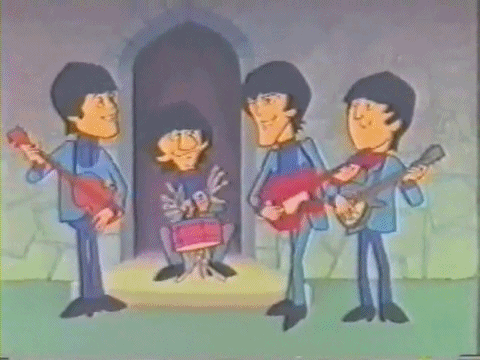
Image courtesy of DeviantArtHolding a dance party can be a great idea for a fundraiser. However, if you’re planning to play recorded music at your public event, you may have to consider some copyright issues first.
The copyright considerations related to recorded music can be a bit complicated. There are two types of rights that attach to copyright-protected musical works: reproduction rights and performance rights. While it may be well understood when we “reproduce” a recording (particularly for public distribution) that we have to pay royalties to the rights-holder, we also have to pay when we play (“perform”) that recording in public.
Beyond that, when it comes to recorded music there is an additional layer of rights to take into account: there is not only the copyright in the song itself, but also the separate but obviously related copyright in the specific recording of that song.
Let’s begin by looking at the song itself. The composer, John, and the lyricist, Paul, collaborate on a song, which we will call “The Song”. As the authors of an original musical work, John and Paul immediately hold copyright in The Song. Now, suppose a performer, George, wants to record that song with a small indie label run by Ringo. This involves reproduction rights under the Copyright ActCopyright Act. In order for George and Ringo to record The Song, they will need a “mechanical license” to record and distribute their version of The Song. The mechanical license is distinguished from a “synchronization license”, which would be required if the song were added to (and thus “synchronized with”) visual content.
That reproduction license will have to be arranged with the rights-holder of The Song. Those rights may be controlled by John and Paul directly, or they may be owned by or managed through a publisher. There are two companies in Canada that represent the reproduction rights of most publishers. These are: the Society for Reproduction Rights of Authors, Composers, and Publishers in Canada (SODRAC); and the Canadian Musical Reproduction Rights Agency (CMRRA). Each has an online database that will allow George and Ringo to look up the specific song and help identify the rights-holder.
So, George and Ringo identify the rights-holder and get their mechanical reproduction license to record and distribute “The Record”, which is their recording of The Song. The terms of their license will cover how the rights-holder will be compensated from copies of The Record for the use of The Song. If the rights-holder is a publisher, the publisher will in turn pay the separately agreed share to John and Paul.
Now, back to our dance party. We want to play recorded music at our party, including The Record. This is where the “performance rights” come into play. If we want to play The Record at a public event (that meets certain criteria), this counts as a performance of both The Record and The Song. Therefore, we are required to ensure that John and Paul are appropriately compensated for our using The Song, as well as ensuring that George and Ringo are appropriately compensated for our using The Record. The Copyright Board determines the amount of this compensation through setting tariffs, and these tariffs are administered through the appropriate “collectives”, in this case, SOCAN and Re:Sound.
The Society of Composers, Authors and Music Publishers of Canada (SOCAN) is the not-for-profit organization in Canada that collects performing rights royalties on behalf of John and Paul (or their publisher) for our use of The Song. SOCAN has a number of different tariffs to cover a range of types of events that use live or recorded music, which ensure that the songwriters are appropriately compensated for those uses.
In some cases, the venue for the event will have an arrangement with SOCAN to cover the use, or if the recorded music is to be played at the event by a hired DJ, the DJ may have an arrangement with SOCAN to cover the use. When holding an event, it is important to confirm that the agreements put in place with the venue and the DJ are clear on who is responsible for making any required payments to SOCAN for the use of the songs at the event. If this is your event, the responsibility for making that payment may remain with you.
What about George and Ringo? While songwriters’ rights regarding the public performances of their songs have long been recognized, it has only been since 1997 that the Copyright Act has recognized performers and record companies for their contributions to such public performances. These rights are called “neighbouring rights”, and Re:Sound is the Canadian not-for-profit company responsible for compensating artists and record companies for their performance rights.
Like SOCAN, Re:Sound has a number of different tariffs covering different types of uses of recorded music that determine the amount to be paid to compensate the artists and record companies. As with payments to SOCAN, when holding an event it is important to confirm that the agreements make clear who will be responsible for making any required payments to Re:Sound for the use of sound recordings at the event.
Playing recorded music can be a valuable addition to many public events or activities, but it is important to be aware of how copyright issues apply. When you are planning any public events that involve playing recorded music, be sure that you properly address the payment requirements of SOCAN and Re:Sound.
For more information about copyright at the University of Alberta, check out the Copyright Office website, or email our help desk at copyright@ualberta.ca.

Adrian Sheppard — Director, Copyright Office
Adrian has been the Director of the University of Alberta’s Copyright Office since April 2015. One role of the Copyright Office is to educate and inform U of A students, faculty and staff on issues related to copyright. Adrian has an LL.B. from the University of Victoria.
Note: This post is intended to provide information and perspective about copyright issues, but should not be considered as legal advice.